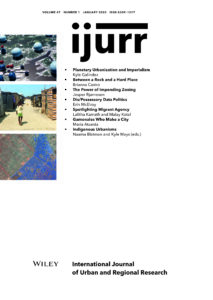A comprehensive zoning plan has been under way for more than a decade for an urban informal settlement in Bobo-Dioulasso, Burkina Faso. In this article I explore the narratives and strategies of its residents in response to the impending restructuring, suggesting that the continual postponements of the zoning plan’s implementation may be understood as constituting an elusive form of urban governance that relegates strategies of both resistance and accommodation to formal governance to the sphere of micro-politics at the level of the neighbourhood. Urban governance is thus approached here neither as a set of formal policies nor through the day-to-day workings of the state bureaucracy, but as a much less tangible form of urban governance that is best studied through its perceivable effects instead of its stated intentions or institutionalized techniques. In the relative absence of the state in the everyday lives of urban residents, the main effects of the workings of the state bureaucracy in this context seem to be to discourage citizen involvement and to slow official procedures to a halt. I argue that the force with which impending evictions and yet-to-be-implemented urban zoning shape residents’ outlook and opportunities for negotiation and mobilization constitutes a form of governance through inaction.
This has been voted by the IJURR editorial board as a high commended article of 2023:
This insightful article centers resistance strategies and resident narratives of the impending rezoning and restructuring of an informal neighborhood in urban Burkina Faso. Reflecting on residents’ responses to the inaction of the local state, this piece identifies techniques of governance, state effects, and subject formation in a context where the state’s reach is partial or absent. In doing so, this contextually grounded piece highlights political dynamics relevant far beyond this secondary African city.

